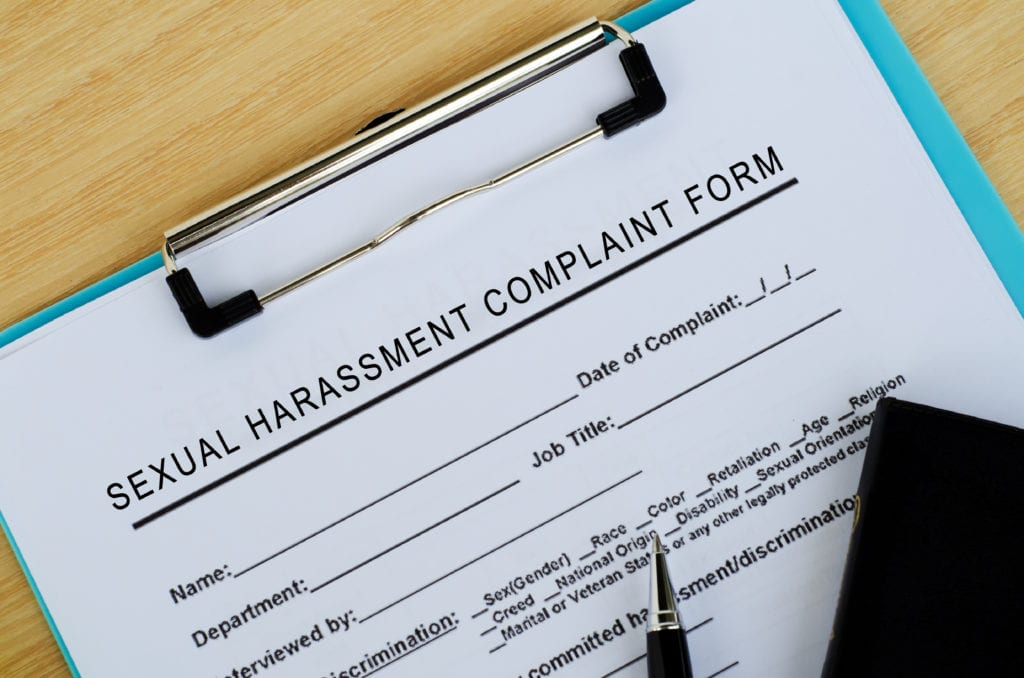Brian J Graber LLC is an Indiana sexual harassment lawyer representing employees sexually harassed in violation of the law. Currently, in Indiana, federal sexual harassment law, Title VII of the Civil Rights Act of 1964, as amended, provides the broadest protection from workplace sexual harassment. To learn more about your rights under federal sexual harassment law, click here.
Indiana Employers Must Be Large Enough for Coverage Under Title VII
Title VII, 42 U.S.C. 2000e(b) requires an Indiana employer to employ at least fifteen or more employees for each working day in each of twenty or more calendar weeks in the current or proceeding calendar year in order to be covered by Title VII. In short, an Indiana employee has no protection from workplace sexual harassment under Title VII, unless his or her employer employs at least 15 or more employees as required by 42 U.S.C. 2000e(b).
The Federal Arbitration Act was amended effective March 3, 2022, to bar mandatory arbitration agreements covering workplace sexual harassment and sexual assault claims. Click here to learn more about your rights to be free from mandatory arbitration agreements under Title VII claims for sexual harassment.
Sexual Harassment Burden of Proof
An Indiana employee must generally prove the following elements for a sexual harassment claim:
- Sexual conduct that is unwelcome;
- The sexual conduct occurred because of the employee’s sex;
- The sexual conduct was sufficiently severe or pervasive that a reasonable person in the employee’s position would find the work environment to be hostile or abusive;
- At the time the conduct occurred, the employee believed the sexual conduct made his or her work environment hostile or abusive; and
- There is a basis for imposing liability on the employer.
Common examples of sexual conduct that may lead to liability under Title VII for sexual harassment include, but are not limited to the following:
- Sexual assault;
- Unwelcome touching of a sexual nature (known as a sexual battery);
- Requests or demands for sexual favors;
- Indecent exposure;
- sexually suggestive gestures;
- Unwelcome communications of a sexual nature;
- Viewing pornography;
- Threats of sexual violence;
- Indecent emails or text messages of a sexual nature.
The basis for imposing liability on an Indiana employer turns on whether the harasser was a “supervisor” as that term is defined by the U.S. Supreme Court in Vance v. Ball State University, 570 U.S. 421 (2013) or a co-worker.
Indiana Employer’s Liability for Supervisor Sexual Harassment
Under Title VII an Indiana employer may be vicariously liable for a supervisor’s unlawful sexual harassment only when the Indiana employer has empowered that harasser-supervisor to take tangible employment actions against the victim, i.e., to effect a significant change in employment status, such as hiring, firing, failing to promote, reassignment with significantly different responsibilities, or a decision causing a significant change in benefits. See Vance, 570 U.S. at 431. Therefore, under Vance, a harasser must be empowered to take tangible employment action against the victim to be considered a “supervisor” under Title VII for imposing liability on an Indiana employer.
However, even if the harasser does not meet the definition of a “supervisor” under the Vance standard, that does not mean that the Indiana employer can escape liability for workplace sexual harassment. Indiana employers may have liability for sexual harassment committed by their employees who do not meet the definition of “supervisor.”
Indiana Employers Have Strict Liability for Its Supervisor’s Harassment That Culminates In Tangible Employment Action

Under Title VII, an Indiana employer is strictly liable if its supervisor’s sexual harassment results in tangible employment action taken against the victim. See Burlington Indus. v. Ellerth, 524 U.S. 742, 753-754 (1998) and Faragher v. City of Boca Raton, 524 U.S. 775, 808 (1998). Under Title VII, an Indiana employer has no affirmative defense to liability for its supervisor’s conduct resulting in tangible employment action taken against the victim.
Indiana Employers May Have An Affirmative Defense To Liability for a Sexually Hostile Work Environment Created By Their Supervisor
Under Title VII, an Indiana employer has liability for a sexually hostile work environment created by its supervisor; however, if the victim/employee did not suffer adverse employment action, the Indiana employer may raise an affirmative defense to liability. In Burlington Indus. v. Ellerth, 541 U.S. at 765, under this affirmative defense, an Indiana employer may avoid liability by proving by a preponderance of the evidence:
- The employer exercised reasonable care to prevent and correct any harassing conduct in the workplace; and
- The victim/employee unreasonably failed to take advantage of opportunities provided by the employer to prevent or correct the harassment or otherwise avoid the harm.

An Indiana employee subjected to a sexually harassing hostile work environment created by a supervisor may be able to avoid this potential affirmative defense by timely and clearly reporting workplace sexual harassment under the Indiana employer’s sexual harassment reporting policy. An Indiana employer that retaliates against its employee for reporting workplace sexual harassment likely opens itself up to liability under Title VII for a retaliation claim.
Indiana Employers May Have Liability For Sexual Harassment By A Co-worker Or 3rd Party
Under Title VII, an Indiana employee may be able to impose liability on his or her employer for sexual harassment committed by a co-worker or a third party by proving the following elements:
- The employee was subjected to sexual conduct;
- The sexual conduct was unwelcome;
- The sexual conduct occurred because of the employee’s sex;
- The conduct was sufficiently severe or pervasive that a reasonable person in the employee’s position would find the employee’s work environment hostile or abusive;
- At the time the sexual conduct occurred, the employee believed the conduct made his or her work environment hostile or abusive;
- The employer knew or should have known about the conduct; and
- The employer did not take reasonable steps to correct the situation or prevent the sexual harassment from recurring.
Indiana Employers May Have Liability For Same-Sex Sexual Harassment

Same-sex sexual harassment is actionable under Title VII. See Oncale v. Sundowner Offshore Servs., 523 U.S. 75, 79-80 (1998). Therefore, Indiana employers have liability for same-sex sexual harassment under Title VII under the same standards described above. If you believe you were subjected to same-sex sexual harassment, contact Brian J Graber LLC, an Indiana sexual harassment lawyer, for a confidential free consultation at (219) 232-9011 or by email.
Indiana Employees Reporting Sexual Harassment Have Protection From Retaliation
Indiana employees who oppose or report incidents of workplace sexual harassment to their employer through any reporting policy in the employee handbook or anti-harassment reporting policy likely have protection from retaliation. Under Title VII, 42 U.S.C. 2000e-3(a), it is an unlawful employment practice for an Indiana employer to take reprisals against an employee in retaliation for opposing or reporting workplace sexual harassment. If you would like to learn more about your rights to be free from retaliation for opposing or reporting workplace sexual harassment, contact Brian J Graber LLC., an Indiana sexual harassment lawyer, for a confidential free consultation at (574) 366-3069 or by email.
Sexual Harassment Statute of Limitations
Indiana employees generally have a limited amount of time to file a Charge of Discrimination with the U.S. Equal Employment Opportunity Commission (EEOC). Click here to learn more about the time limits for filing a Charge of Discrimination with the EEOC. Federal employees have a more complex complaint process. Click here to learn about the federal sector EEO Complaint Process. The statute of limitations for a Title VII sexual harassment claim can be complex. It is best to consult an experienced Indiana sexual harassment lawyer as soon as possible.
If you would like to learn more about your rights to be free from workplace sexual harassment in Indiana, contact Brian J Graber LLC, an Indiana sexual harassment lawyer at (219) 232-9011, or by email for a free confidential consultation.
